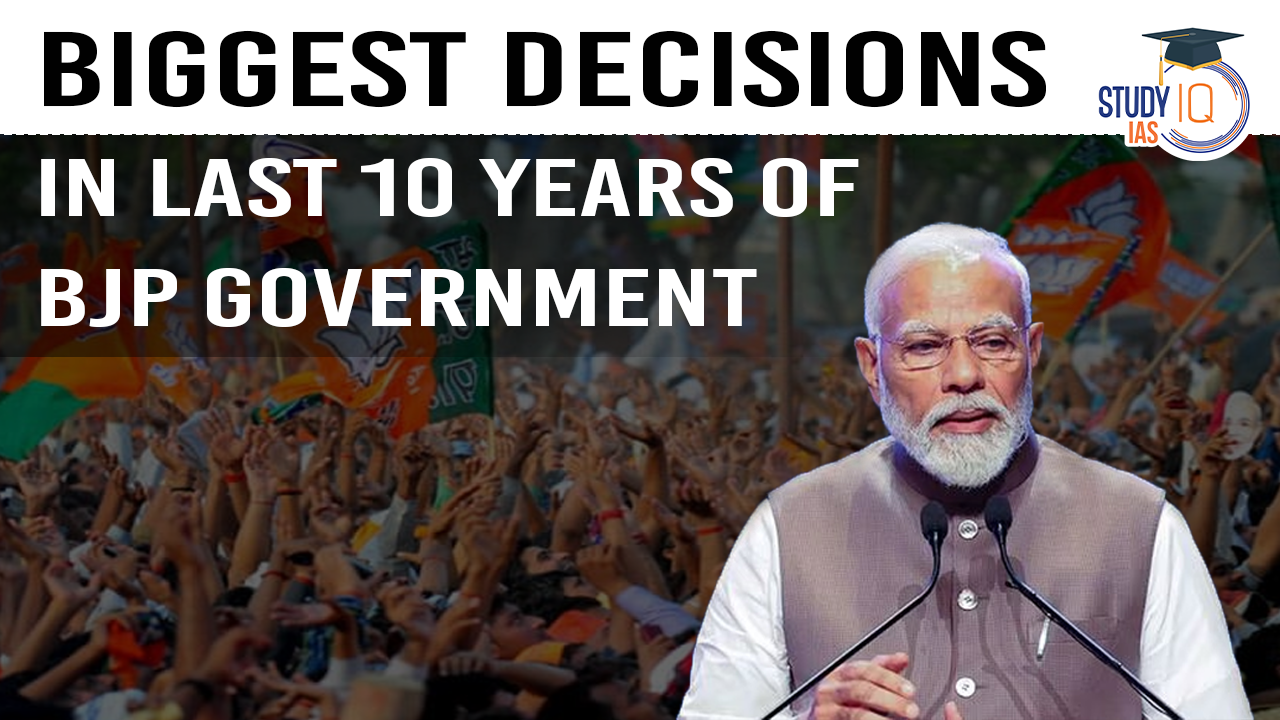Table of Contents
The Bharatiya Janata Party (BJP), under the leadership of Prime Minister Narendra Modi, has made several significant decisions over the past decade. These decisions have had profound impacts on India’s economy, society, and global standing. The following study notes provide an overview of the key initiatives and their implications.
Biggest Decisions in Last 10 Years of BJP Government
Demonetization (2016)
Description:
- On November 8, 2016, PM Narendra Modi announced the demonetization of ₹500 and ₹1,000 banknotes.
- Objectives: Curb black money, counterfeit currency, and corruption.
- Impact: Widespread disruption in the economy, particularly affecting small businesses and the informal sector.
Key Points:
- Aimed to eliminate black money and counterfeit currency.
- Initial chaos due to cash shortages.
- Long-term effects on digital payments and tax compliance.
| Details | |
|---|---|
| Launch Date | November 8, 2016 |
| Objectives | Curb black money, counterfeit currency, corruption |
| Immediate Impact | Economic disruption, cash shortages |
| Long-term Effects | Increase in digital payments, tax compliance |
Goods and Services Tax (GST) (2017)
Description:
- Launched on July 1, 2017, GST is a major tax reform to unify the national market.
- Objectives: Simplify the tax system, increase compliance, and reduce tax evasion.
- Impact: Initial implementation challenges but significant long-term benefits for the economy.
Key Points:
- Replaced multiple indirect taxes with a single tax structure.
- Created a unified national market.
- Enhanced ease of doing business.
| Details | |
|---|---|
| Launch Date | July 1, 2017 |
| Objectives | Simplify tax system, unify market |
| Immediate Impact | Implementation challenges |
| Long-term Effects | Economic integration, ease of business |
Abrogation of Article 370 (2019)
Description:
- On August 5, 2019, the special status of Jammu and Kashmir under Article 370 was revoked.
- Objectives: Integrate Jammu and Kashmir with India, and enhance governance.
- Impact: This controversial move with significant political and security implications.
Key Points:
- Ended special autonomy of Jammu and Kashmir.
- Bifurcated the state into two Union Territories: Jammu & Kashmir and Ladakh.
- Led to increased security measures and political unrest.
| Details | |
|---|---|
| Date | August 5, 2019 |
| Objectives | Integrate J&K, enhance governance |
| Immediate Impact | Political unrest, security measures |
| Long-term Effects | Ongoing political and security debates |
Citizenship Amendment Act (CAA) (2019)
Description:
- Passed in December 2019 to provide citizenship for non-Muslim refugees from Pakistan, Bangladesh, and Afghanistan.
- Objectives: Protect persecuted minorities.
- Impact: Sparked nationwide protests and debates on secularism.
Key Points:
- Controversial for excluding Muslims.
- Nationwide protests and criticism.
- Viewed as discriminatory by many.
| Details | |
|---|---|
| Date | December 2019 |
| Objectives | Protect persecuted minorities |
| Immediate Impact | Nationwide protests |
| Long-term Effects | Ongoing legal and social debates |
Farm Laws (2020)
Description:
- Three laws were passed to liberalize the agricultural sector.
- Objectives: Allow farmers to sell produce outside APMC markets.
- Impact: Massive protests led to the repeal of the laws in 2021.
Key Points:
- Aimed to provide more freedom to farmers.
- Fear of undermining the MSP system.
- Laws were repealed due to protests.
| Details | |
|---|---|
| Date | September 2020 |
| Objectives | Liberalize agricultural sector |
| Immediate Impact | Massive protests |
| Long-term Effects | Laws repealed, ongoing debates |
National Education Policy (NEP) (2020)
Description:
- Approved in July 2020, introducing major changes to the education system.
- Objectives: Make education more holistic and aligned with 21st-century needs.
- Impact: Emphasis on mother tongue/local language instruction and vocational training.
Key Points:
- New curricular structure.
- Focus on holistic education.
- Emphasis on vocational training.
| Details | |
|---|---|
| Date | July 2020 |
| Objectives | Holistic, modern education system |
| Immediate Impact | Implementation challenges |
| Long-term Effects | Improved education quality and access |
Additional Significant Initiatives of of BJP Government
Pradhan Mantri Jan Dhan Yojana (2014)
Description:
- Launched on August 28, 2014, to provide universal access to banking services.
- Impact: Significantly increased the number of bank accounts and financial inclusion.
| Aspect | Details |
|---|---|
| Launch Date | August 28, 2014 |
| Objectives | Financial inclusion |
| Immediate Impact | Increased bank accounts |
| Long-term Effects | Enhanced savings, credit access |
Ayushman Bharat Scheme (2018)
Description:
- Launched in September 2018, the world’s largest government-funded healthcare program.
- Impact: Provided free healthcare access to 500 million low-income earners.
| Aspect | Details |
|---|---|
| Launch Date | September 2018 |
| Objectives | Universal healthcare |
| Immediate Impact | Increased healthcare access |
| Long-term Effects | Improved public health outcomes |
Make in India Initiative (2014)
Description:
- Launched in September 2014 to boost manufacturing and entrepreneurship.
- Impact: Encouraged investments in key sectors, promoting job creation.
| Aspect | Details |
|---|---|
| Launch Date | September 2014 |
| Objectives | Boost manufacturing, job creation |
| Immediate Impact | Increased investments |
| Long-term Effects | Economic growth, job opportunities |
Conclusion
The BJP government’s major decisions over the past decade have aimed at transforming various aspects of Indian society and the economy. These initiatives reflect a focus on economic reforms, social welfare, national security, and governance transparency. While some decisions have been widely appreciated, others have sparked significant debate and controversy. Understanding these decisions provides insight into the government’s priorities and their impact on India’s development trajectory.
Sharing is caring!


 World Autism Awareness Day 2025, Theme, ...
World Autism Awareness Day 2025, Theme, ...
 International Days List of 2025, Importa...
International Days List of 2025, Importa...
 Asia’s Largest Tulip Garden
Asia’s Largest Tulip Garden





















